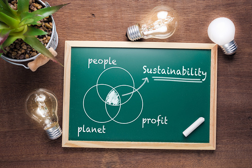That four- minute rebuke to world leaders by 15 year - old Swedish teenager Greta Thunberg stunned her audience and garnered international headlines. Mark Carney, former Bank of Canada and Bank of England Governor is among a growing chorus of the international governmental and financial elite who have decided to go beyond just “Talking the Talk” and “Walk the Talk” of making the planet sustainable for this future generation. He’s opted to forego seven-figure salary chair positions in global financial services for an “encore career” as U.N. special envoy on climate change and climate finance. He was the featured host speaker at the prestigious BBC Reith Lectures (www.bbc.co.uk/reithlectures) for 2020. I’ve provided the web site link to what is a series of four one- hour lectures. Take a listen. He brings a fascinating lucidity to the debate of how we must reconcile the fundamental values of society in the marketplace for goods and services with the critical need to embrace social and environmental sustainability as the driving force in a market economy. The fundamental problem according to Carney, and an increasing number of other economic and financial luminaries, is that we’ve become conditioned to believe that market driven financial metrics such as gross domestic product (GDP) are measures of the health and wealth in society. If the Dow Jones stock market index is on the rise that means an increase in dividends to shareholders and all is well. In short, we’ve shifted from market economy to a market driven society. What makes sense is what makes money. How that money is made is of secondary concern. Roger Martin, former Dean and now Professor Emeritus at University of Toronto’s elite Rotman School of Management has written a much acclaimed and reader friendly authoritative book with the ominous title, When More is Not Better[1]. He makes a convincing argument that the obsession with more growth and more profit in an unfettered market place for goods and services with a less government the better mantra isn’t contributing to long term sustainability. Nor is it making for a more affluent society as 90% of the wealth is now sequestered in 10% of the population, more often than not is offshore tax havens. Neither Mark Carney nor Roger Martin and their contemporaries, among them Bill Gates, can be in any way labelled as bleeding heart socialists. They’re adherents to and proponents of market- based economies. The fundamental problem is that economics has supplanted the moral and social principals that are the bulwarks of a sustainable society. The misappropriation of the architecture of a sustainable society by marketplace driven economic principles and practices has created a crisis that is threatening the existence of a global civilization. Does this sound histrionic? Not when you listen to what Mark Carney has to say in his four -part lecture series. The foundation for this renowned contemporary central banker’s source of knowledge is an interdisciplinary Ph.D. in economics, politics and philosophy. Yes, philosophy! The starting point for his study in economics was the writings of Adam Smith; a moral philosopher. Smith’s seminal The Wealth of Nations, the foundation for modern day economic theory, was intended to be a guide and not the driving force, for the application of the theory and principles of his substantive Theory of Moral Sentiments. An economic “Ides of March” is upon us. We need to undertake a dramatic shift from being a market driven society to being a morally focused society with sustainability of civilization as the driving force in a market - oriented economy. [1] Roger L. Martin, When More is Not Better, Overcoming America’s Obsession with Economic Efficiency. Boston. Harvard University Press (2020).
0 Comments
Your comment will be posted after it is approved.
Leave a Reply. |
John G. KellyMentoring & Counselling Archives
December 2023
Categories
All
|


 RSS Feed
RSS Feed
